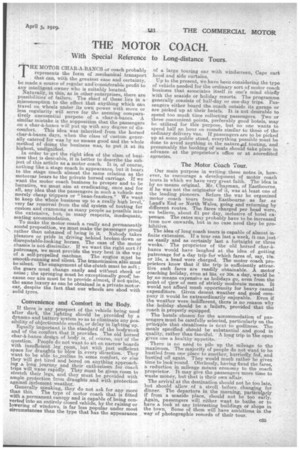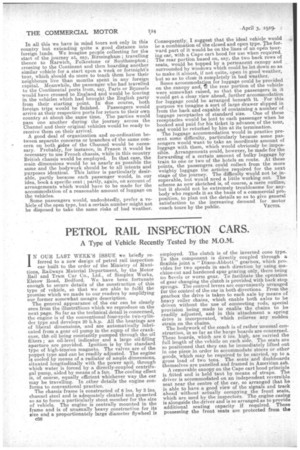THE MOTOR COACH.
Page 13

Page 14

If you've noticed an error in this article please click here to report it so we can fix it.
With Special Reference to Long-distance Tours.
THE MOTOR CHAR-A-BANGS or coach probably represents the form of mechanical transport that can, with the greatest ease and certainty, be made a source of regular and considerable profit to any intelligent owner who is suitably located. Naturally, in this, as in other enterprises, there are possibilitiesof failure. The chief of these lies in a misconception to the effect that anything which can travel on wheels under its own power with more or less regularity will serve for the seeming comparatively unessential purpose of a char-a-banes. A similar mistake is the supposition that the passengers on a char-a-banes will put up with any degree of discomfort. This idea was inherited from the horsed char-l-bancs days, when the class of custom generally catered for was by no means good and the whole method of doing the business was, to put it at its highest, undignified.
In. order to get the right idea of the class, of business that is desirable, it is better to describe the sub. ject of this article as a motor coach. It is, of course, nothing like .a stage coach in appearance, but it hears to the stage coach almost the same relation as the motorcar bears to the private horsed carriage. If we want the motor coach business to prosper and to be lucrative, we must aim at eradicating, once and for all, any idea that the passengers in such a Vehicle are merely cheap trippers or "bean-feasters." We want to keep the whole business up to a really high-level,very far removed from the old system of touting for custom and cramming as many people as possible into the extensive, but-, in many respects, inadequate, seating accommodation. To make the motor coach a really and permanently sound proposition, we must make the passenger proud rather than ashamed of being in it. Nobody takes pleasure or pride in driving behind broken-down or disreputable-looking horses. The case of the motor chassis is not dissimilar. If we want the right sort kf patronage, we must provide the very best in the way of a self-propelled machine. The engine must be smooth-running and silent. The transmission also must be silent. The engagement of the clutch must be soft ; the gears must change easily and without shock or noise ; the springing must be exceptionally good because our aim must be to provide almost, if not quite, the same luxury as can be obtained in a private motorcar, despite the fact that our wheels are shod with solid tyres.
Convenience and Comfort in the Body.
If there is any prospect of the vehicle being used after dark, the lighting should be provided by a dynamo and battery system sons to eliminate any possibility of objectionable smells, or delay in lighting up.
Equally important is the standard of the bodywerk and of the comfort that it provides. The old barged char-a-bancs design of body is, of course, out of the question. People do not want to sit on narrow boards with insufficient leg room, but with just sufficient space for draughts to blow in every direction. They want to be able toereeline in some comfort, or else they will get tired and bored on anything approaching a long journey and their enthusiasm for coach trips will wane rapidly. They must be given'room to stretch their legs, and they must be provided with ample protection from draughts and with protection against inclement weather.
Generally speaking, they do not ask for any more than this. The type of motor coach that is fitted with a permanent canopy and is capable of being converted into an entirely closed vehicle, by the raising or lowering of windows, is far less popular under most circumstances than the type that has the appearance of a large touring car with windscreen, Cape cart hood and side curtains.
Lip to the present, we have been considering the type of vehicle needed for the ordinary sort of motor coach business that associates itself in one's mind chiefly with the seaside or holiday resorts. The programme generally consists of half-day or one-day trips. Passengers either board the coach outside its garage or are picked up at their hotels. It is not desirable to spend too much time collecting passengers. Two or three convenient points, preferably good hotels, may be utilized for this purpose, but no one wants to spend half an hour on rounds similar to those of the ordinary delivery van. If passengers are to be picked up at some public stand, everything possible must be done to avoid anything in the natureacd touting, and presumably the booking of seats should.take place in advance at the proprietor's office or at accredited agencies.
The Motor Coach Tour.
Our main purpose in writing these notes is, however, to encourage a development of motor coach tours in which we have very great faith. The idea is by no means original. Mr. Chapman, of Eastbourne, if he was not the originator of it, was at least one of the leading pioneers. Before the war he organized motor coach tours from Eastbourne as far as Land's End or North Wales, going and returning by different routes. The fares charged per head were, we believe, about 21 per day, inclusive of hotel expellees. The rates may probably have to be increased from now onwards, but in no case need they be prohibitive.
The idea of long coach tours is capable of almost infinite extension. If a tour can last a week, it can just as easily and as certainly last a fortnight or three weeks. The proprietor of the old horsed char-abanes would have laughed at the idea of getting patronage fot a day trip for which fares of, say, 10s. or 15s. a head were charged. The motor coach proprietors know that if the trip is sufficiently attractive such fares are readily obtainable. A. motor coaching holiday, even at 25s. or 30s. a day, would be by no means expensive as holidays go, even from the point of yiew of men of strictly moderate means. It would not afford much opportunity for heavy casual expenditure. Given decent weather and good company it would be extraordinarily enjoyable. Even if the weather were indifferent, there is no reason why the holiday should be a faalute, provided that the coach is properly equipped.
The hotels chosen for the accommodation of passengers must be carefully selected, particularly on the principle that cleanliness is next to godliness. The meals specified should be substantial and goad in quality, rather than fanciful. A long trip in the open gives one a healthy appetite.
There is no need to pile up the mileage to the maximum. The majority of people do not want to be hustled from one place to another, hurriedly fed, and hustled off again. They would much rather be given time to look round. Obviously, having fixed the fares, a reduction in mileage means economy to the coach proprietor. It may give the passengers more time to waste money, but that is their own affair.
The arrival at the destination should not be too late, but should allow, of a stroll before changing for dinner. The departure in the morning, particularly if from a seaside place, should not be too ea-Ay. Again, passengers will either want to bathe or to have a look at any interesting buildings or shops in the town. Some of them will have ambitions. in the way of photographic records of their tour.
In all this we have in mind tours not only in this country but extending quite a good distance into foreign lands. We imagine people collecting for the start of the journey at, say, Birmingham ; travelling thence to Harwich, Folkestone or Southampton ; crossing to the Continent and then boarding another similar vehicle for a start upon a week or fortnight's tour, which should do more to teach them how their neighbours live than months spent in any foreign capital. Meanwhile, the passenger who had travelled to the Continental ports from, say, Paris or Brussels would have crossed to England and would be touring in the vehicles which had brought the English party from their starting point. In due course, both foreign trips would be finished. Passengers would arrive at their respective ports for return to their own country at about the same time. The parties would pass one another during the journey across the Channel and their original vehicles would be ready to receive them on their arrival.
A good deal of organization and co-ordination between separate concerns or branches of the same con
" cern on both fides of the Channel would be necessary. Probably, for instance, in France it would be necessary to use French chassis, while in this country British chassis would be employed. In that case, the main dimensions would be as nearly as possible the same and the bodywork should be to all intents and purposes identical. This latter is particularly desirable, partly because each passenger would, in our idea, book a specific seat ; partly, again, on account of arrangements which would have to be made for the accommodation of a reasonable amount of luggage on the vehicles.
Some passengers would, undoubtedly, prefer a vehicle of the open type, but a certain number might not be disposed to take the same risks of bad weather.
Consequently, I suggest that the ideal vehicle would be a combination of the closed and open type. The forward part of it would be on the lines of an open touring car, with a Cape cart hood for use when required. The rear portion based on, say, the two back rows of seats, would be topped by a permanent canopy and surrounded by -Windows which could be let down so as to make. it almost, if not quite, open in good weather, but so as to close it completely in bad weather.
Some accommodatton for luggage could be provided on the canopy and, 11 the rear portion of the vehicle were somewhat raised, so that the passengers in it would get a clear view ahead, further accommodation for luggage could be arranged beneath it. For this ,purpose we imagine a sort of largo drawer slipped in from the back and capable of containing a number of luggage receptacles of standard size. One of these receptacles would be lent to each passenger when he booked and paid for his ticket in advance of the tour, and would be returned by him at its termination.
The luggage accommodation would in practice present some difficulty, particularly because some passengers Would want to take an inordinate amount of luggage with them, which would obviously be impossible. Arrangements could, however, be made for the forwarding of a certain amount of bulky luggage bytrain to one Or two of the hotels en route. At these points, the passengers could collect, from the more weighty luggage the articles required for the next stage of the journey. The difficulty would not be insuperable, but would need a little working out. The scheme as now sketched is, of course, a mere outline, but it should not be extremely: troublesome for anybody.who regards it as the basis of a commercial proposition, to plan out the details so as to give general satisfaction to the increasing demand for motor coach tours by the public. VECTIS.






















